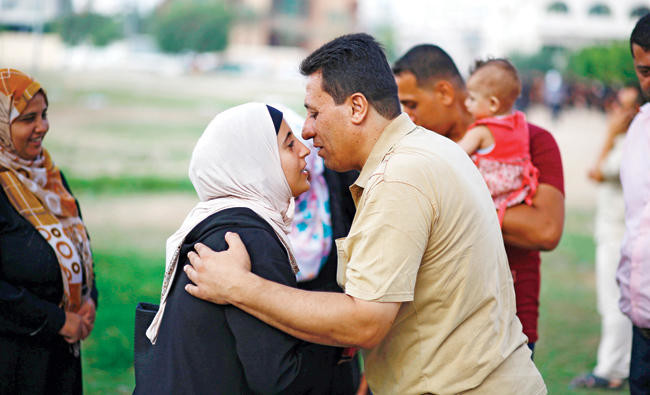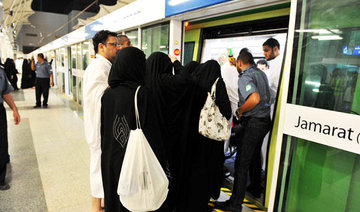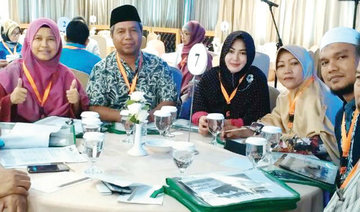AMMAN: For the besieged Gazan population, the Hajj season is a godsend. Muslims fortunate enough to be chosen for the pilgrimage leap at the opportunity to escape the prison they have been stuck in for a decade.
Saudi Arabia normally grants one Hajj visa for every 1,000 Muslims in a country. With Palestine having a population of less than 7 million, the annual permits given to applicants from the West Bank (including East Jerusalem and Gaza) to travel to the holy places in Makkah and Madinah are about 6,500. Gazans, who make up 40 percent of the overall Palestinian population under occupation, are entitled to 2,500 visas.
The Palestinian minister of Awqaf said that this year’s Hajj consists of 2,640 pilgrims from Gaza. This number includes 1,000 relatives of those killed by Israeli forces, who will go as the guests of King Salman.
Qadaffi Al-Qatati, a senior official at the Islamic Waqf Ministry in Gaza, told Arab News that the problem is how to decide who gets to go. “When we opened registration for the Hajj in 2010, over 30,000 applied. For them this was a chance to leave the besieged Gaza Strip, even for a short time.”
The large number of applicants forced the ministry to make the choice by lottery. The problem was what to do in the next year with those who were not chosen, so it was decided to carry on randomly selecting people for seven years in a row.
“While this allowed people to know which year they would go on Hajj, it caused other problems for those whose livelihood, and therefore their ability to pay the cost of the Hajj, changed,” Al-Qatati said. At the same time, he explained that if they allow new registrations, they might get as many as 100,000 people applying.
Gazans have been unable to enjoy Umrah, which is the off-season pilgrimage, for the past three years because of the near-permanent closure of the Rafah crossing by the Egyptian authorities, allegedly due to security concerns.
Over the years, other problems have occurred. Some would-be pilgrims have become sick and even died, while others simply lost interest or were no longer able to pay the costs. “We introduced a substitute system where next of kin are allowed to take the place of their relative who is sick, unable to travel or no longer living,” said Al-Qatati. “If that failed, we would go back to the lottery to make the choice of who can go instead.”
While the system seems to have worked, the journeys to Makkah and Madinah were not so easy. While some 75 tour agencies are registered by the ministries of tourism and Waqf to arrange the trips, the bigger problems lie with the border authorities. Average costs of the trip – including buses, round-trip airplane costs and accommodation in Makkah and Madinah – are about $3,000 per person.
In earlier years, Hajj applicants used to be able to take charter flights from the nearby Al-Arish Airport direct to Makkah, but the violence in Egypt since the Arab Spring has made the airport unusable. Instead, pilgrims have to spend two to three days on the road and in airport lounges waiting to get on the plane.
While there are long delays on the Egyptian side of the border, the biggest delay is on the way back. Travelers told Arab News that the Egyptian authorities, who confiscate passports in both directions, wait for all the planes bringing Gaza passengers back to arrive first and get through passport control, before allowing the bus convoy – often as many as 16 large buses – to proceed to the Rafah crossing.
Hajj ‘a gift from heaven’ for Gazans
Hajj ‘a gift from heaven’ for Gazans

Prince William tours AlUla, visits nature reserve

- Meets with rangers of the Wildlife Conservation and Biodiversity Protection at Sharaan Nature Reserve
RIYADH: Britain’s Prince William wrapped up the final day of his official visit to Saudi Arabia with a tour of AlUla, where he visited the Wildlife Conservation and Biodiversity Protection at Sharaan Nature Reserve.
Prince Badr bin Abdullah bin Farhan, the Saudi minister of culture, accompanied the 43-year-old heir to the British throne, an avowed environmentalist, during the tour. Prince William also met with rangers working to conserve the area’s wildlife population.

AlUla is home to the Hegra archaeological site, a UNESCO World Heritage site famed for its ancient Nabataean tombs dotted amid the pristine sandstone mountains and valleys.
Saudi authorities have been vastly working on in recent years to make AlUla a top-tier destination for luxury travelers and art exhibitions.














